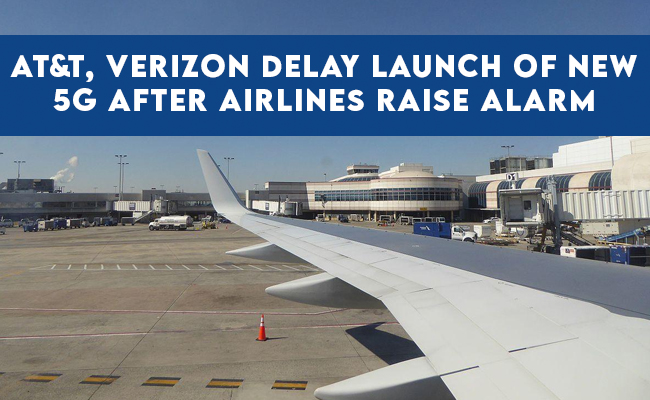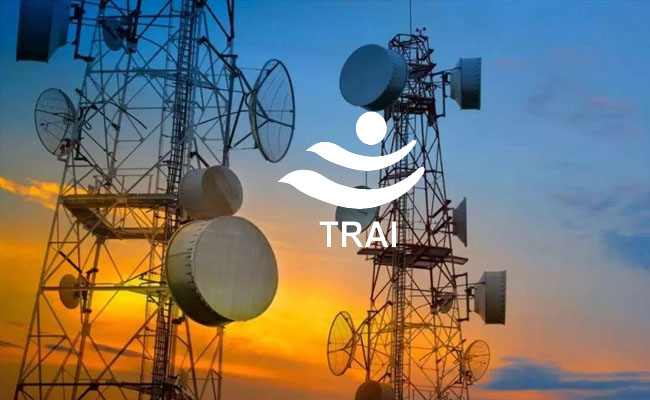AT&T, Verizon delay launch of new 5G after airlines raise alarm
By MYBRANDBOOK

AT&T and Verizon will delay launching new wireless service near key airports after the nation’s largest airlines said the service would interfere with aircraft technology and cause widespread flight disruptions. The decision from the companies came as the Biden administration intervened to broker a settlement between the telecoms and airlines over a rollout of new 5G service.
The companies said they will launch 5G or fifth-generation service Wednesday, but they will delay turning on 5G cell towers within a 2-mile radius of runways designated by federal officials. They did not say how long they would keep those towers idle.
President Joe Biden said the decision by AT&T and Verizon “will avoid potentially devastating disruptions to passenger travel, cargo operations, and our economic recovery, while allowing more than 90% of wireless tower deployment to occur as scheduled.” He said the administration will keep working on a permanent solution.
Even with the concession by the telecommunications companies, federal officials said there could be some cancellations and delays because of limitations of equipment on certain planes. Delta Air Lines also said there could be issues with flights operating in bad weather because of airport restrictions that regulators issued last week, when the 5G rollout appeared to be on schedule.
The new high-speed wireless service uses a segment of the radio spectrum that is close to that used by altimeters, which are devices that measure the height of aircraft above the ground. Altimeters are used to help pilots land when visibility is poor, and they link to other systems on planes.
AT&T and Verizon say their equipment will not interfere with aircraft electronics, and that the technology is being safely used in 40 other countries. However, the CEOs of 10 passenger and cargo airlines including American, Delta, United and Southwest say that 5G will be more disruptive than earlier thought. That is because dozens of large airports were subject to flight restrictions announced last week by the Federal Aviation Administration if 5G service was deployed nearby. The CEOs added that those restrictions wouldn't be limited to times when visibility is poor.
The showdown between the airline and telecom industries and their rival regulators — the FAA and the Federal Communications Commission, which oversees radio spectrum — threatened to further disrupt the aviation industry, which has been hammered by the pandemic for nearly two years.
The airlines and the FAA say that they have tried to raise alarms about potential interference from 5G C-Band but the FCC ignored them.
The telecoms, the FCC and their supporters argue that C-Band and aircraft altimeters operate far enough apart on the radio spectrum to avoid interference. They also say that the aviation industry has known about C-Band technology for several years but did nothing to prepare — airlines chose not to upgrade altimeters that might be subject to interference, and the FAA failed to begin surveying equipment on planes until the last few weeks.
One solution could be outfitting all altimeters with good filters against interference, although there could be a fight over who pays for that work — airlines or telecom companies.


Happiest Minds brings in an innovative GenAI chatbot
Happiest Minds Technologies has announced the new GenAI chatbot - ‘hAPPI...

Government mandates encryption for CCTV cameras to ensure netw
In the wake of issuing an internal advisory on securing CCTV cameras at g...

TRAI recommends allowing only Indian entities to participate i
The Telecom Regulatory Authority of India (TRAI) has recommended that onl...

Galaxy AI is available on more devices with Samsung One UI 6.1
Samsung has expanded the range of smartphones to which One UI 6.1 and Gala...


Technology Icons Of India 2023: Girish Mathrubootham
Girsh Mathrubootham envisioned and co-founded Freshworks. Freshworks, ...

Technology Icons Of India 2023: Roshni Nadar Malhotra
Roshni Nadar Malhotra is an Indian billionaire businesswoman and the c...

Technology Icons Of India 2023: Ashish Kumar Chauhan
Ashish works as the CEO of the National Stock Exchange (NSE). He is al...


PGCIL transforming India with its wide power transmission network
Engaged in power transmission, POWERGRID or PGCIL is a stated owned In...

BBNL empowering rural India digitally
BBNL provide high speed digital connectivity to Rural India at afforda...

NIC bridging the digital divide and supporting government in eGovernance
The National Informatics Centre (NIC) is an Indian government departme...


SONATA INFORMATION TECHNOLOGY LIMITED
Sonata Software Limited is a leading Modernization engineering company...

REDINGTON INDIA LIMITED
Redington (India) Limited operates in the IT product distribution busi...

TEXONIC INSTRUMENTS
Texonic has carved a niche for itself in the Technology Distribution i...